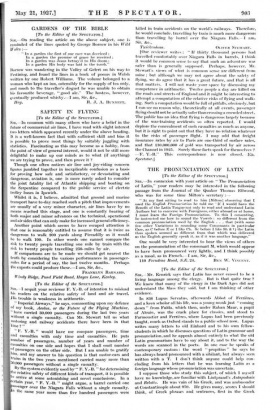[To the Editor of the SpEcTATon.] Sia,—Mr. Kenrick says that
Latin has never ceased to be a living language among the clergy. But is that quite true? We know that many of the clergy in the Dark Ages (lid not
understand the Mass they said, but I am thinking of other evidence.
In 836 Lupus Servatus, afterwards Abbot of Ferrieres, and a keen scholar all his life, was a young monk just coming down" from Fulda, which then, under Raban Maur, a pupil of Alcuin, was the crack place for classics, and stood to Farmoustier and Ferrieres, where Lupus had been previously taught, much as Oxford stands to a public school now. Lupus writes many letters to old Einhard and to his own fellow- students in Which he discusses questions of Latin grammar and pronunciation, and he appeals almost entirely to what the old Latin grammarians have to say about it, and to the way the words are scanned in the poets. In one case he speaks of contemporary custom : the word " propitius " he says he has always heard pronounced with a sibilant, but always seen written with a T. I don't think anyone could help con- cluding from his letters that he was learning Latin as a foreign language whose pronunciation was uncertain.
I suppose those who study this subject, of which I myself have no knowledge, are familiar with Liutprand's Antapodosis and Relatio. He was vain of his Greek, and was ambassador at Constantinople about 970. He gives many, scores I should think, of Greek phrases and sentences, first in the Greek
alphabet and then phonetically rendered in Latin letters. They would, I imagine, give a trustworthy representation both of Latin and Greek pronunciation in his day.—! am, Sir, &c.,
W. P. HERRINGHAM.











































 Previous page
Previous page